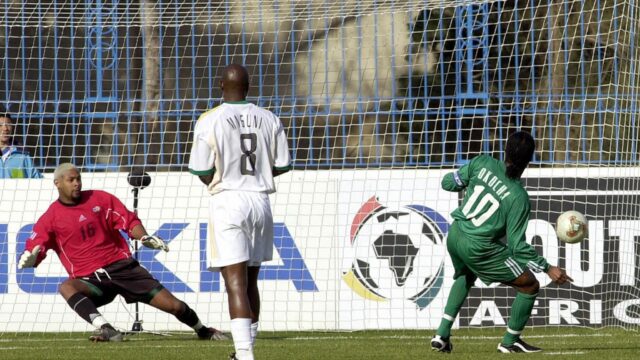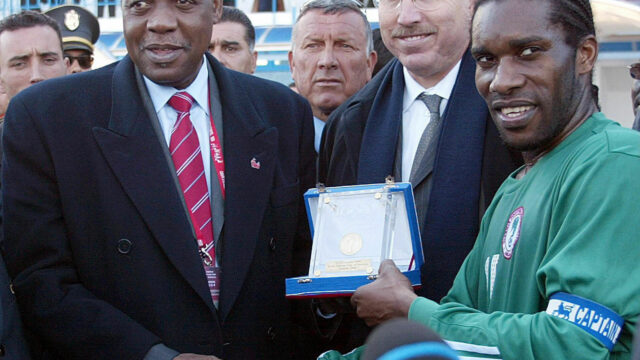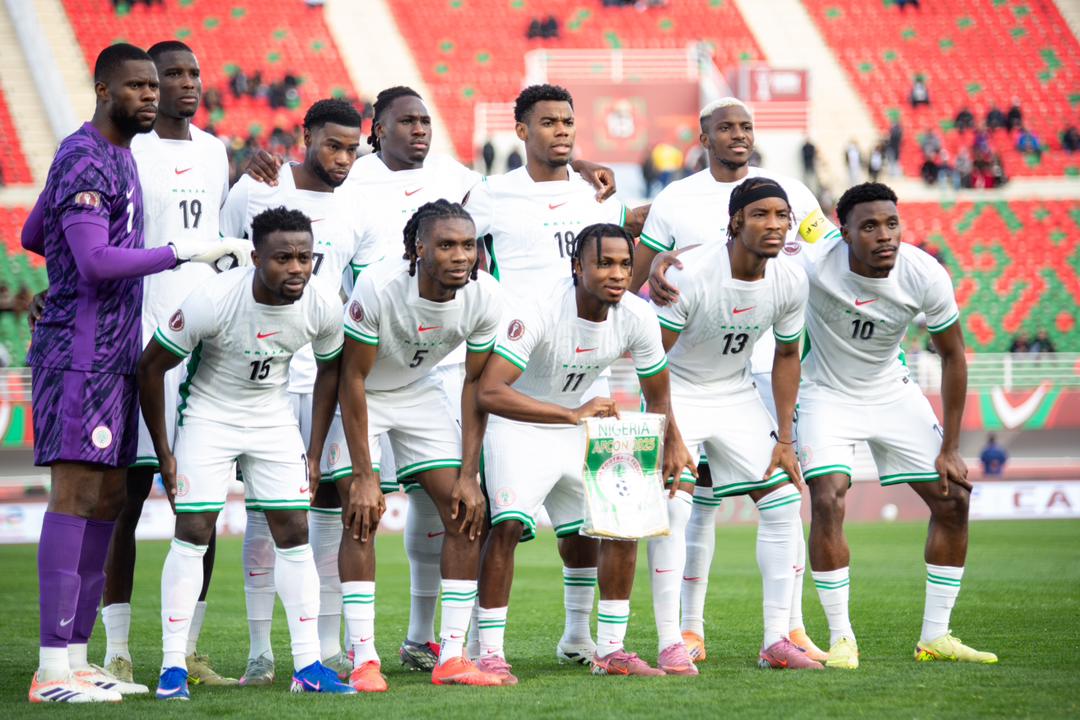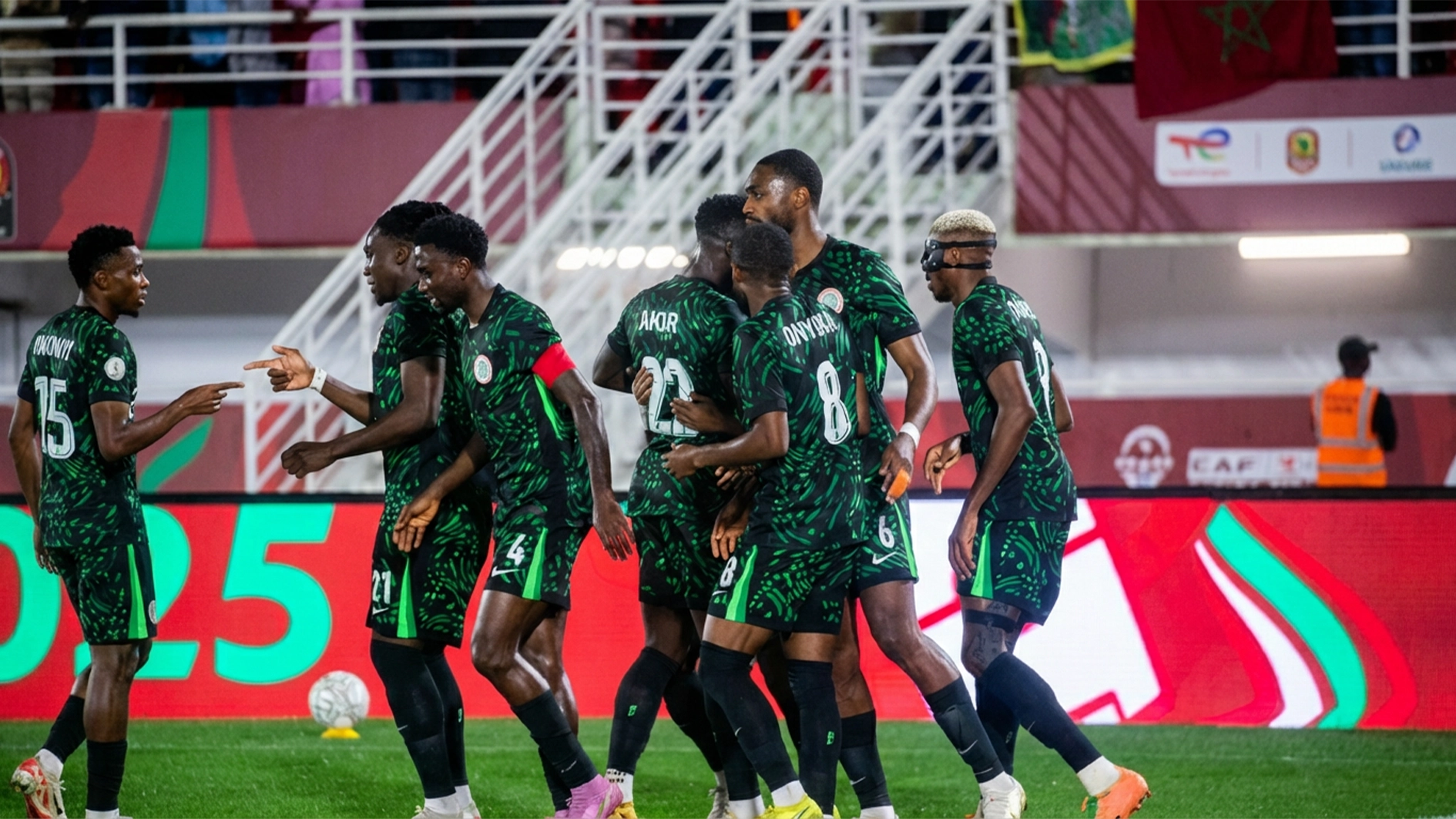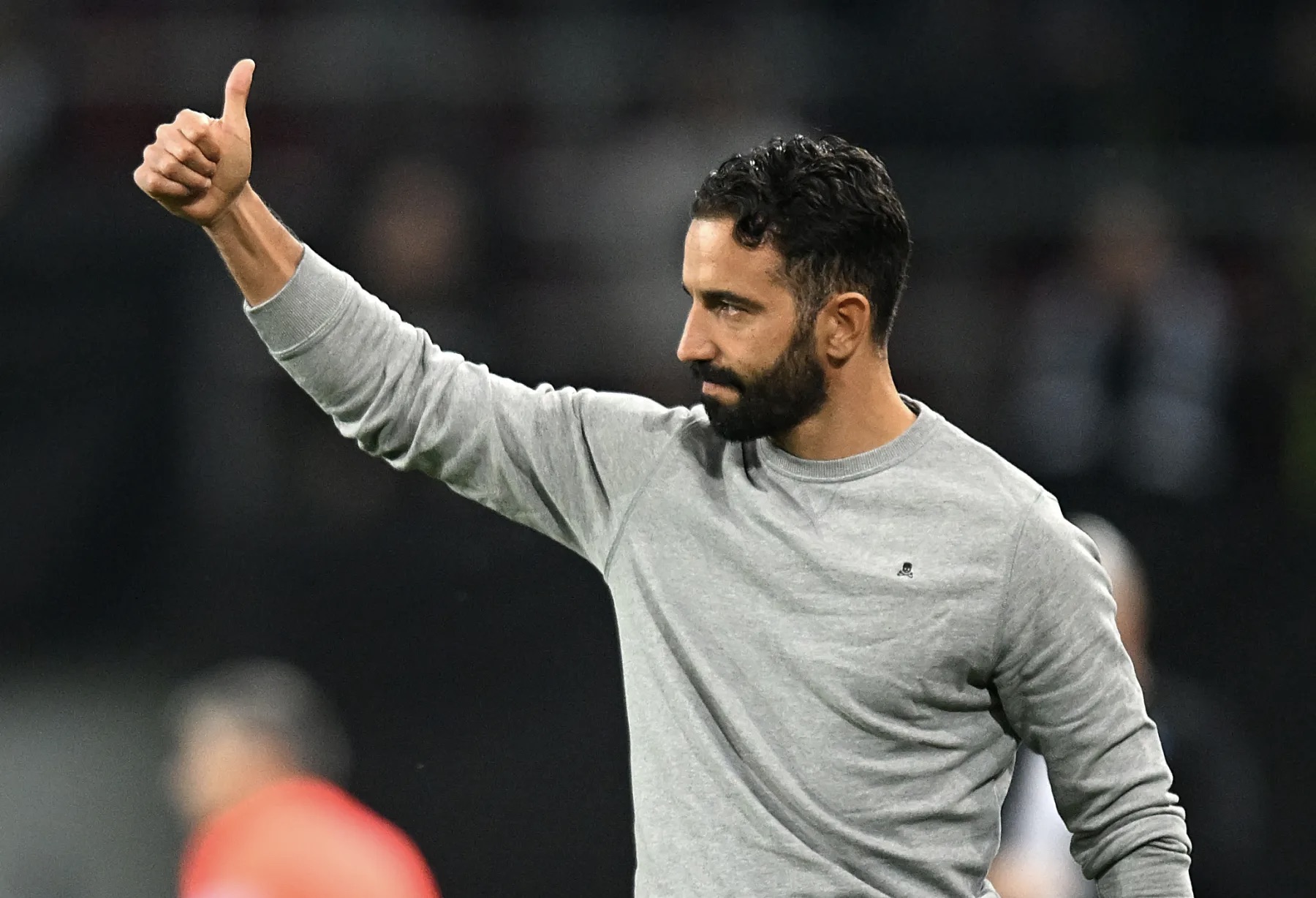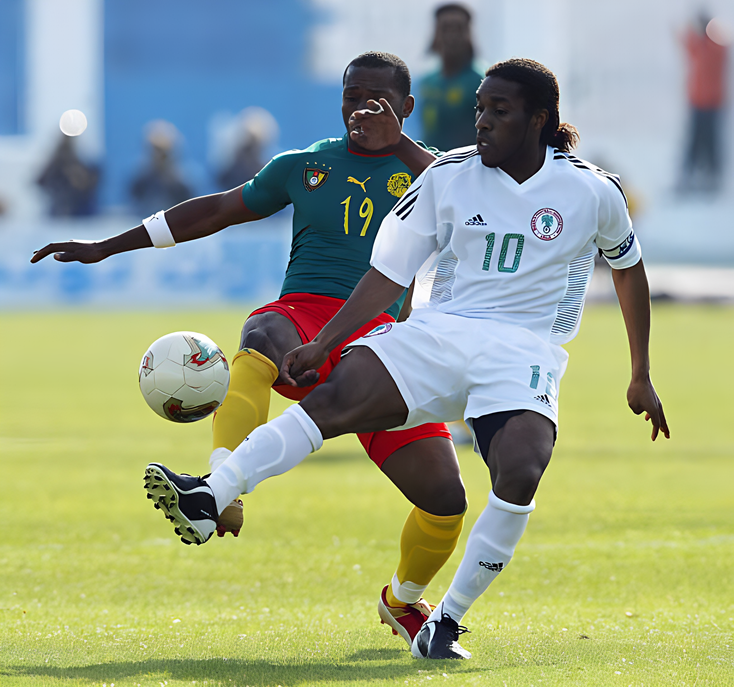
It’s winter in Tunisia, January to be precise and the nation is about to open its doors to the biggest tournament on the continent; The Africa Cup of Nations. Touching down the shores of the land of the Carthage are the greatest players the continent has to offer.
In fact, it would be a tournament majorly dominated on paper by two of the greatest African footballers at the moment: Samuel Eto’o, the reigning CAF African footballer of the year, and Jay Jay Okocha, the reigning BBC African footballer of the year, who for over a year, have been churning out brilliant performances for their clubs in Europe and inadvertently started a sort of rivalry for who the best African footballer really is. This left many salivating at the prospect of the superstar duo setting an early marker for the 2004 AFOTY award as both men bore the weight of their various nations hopes of AFCON glory in Tunisia.
Jay Jay Okocha came into the tournament with a renewed zest for the game after the disappointing few months at the end of his PSG career had him looking like a shadow of himself in Mali two years prior as Nigeria laboured to a third-place finish, despite possessing the most complete team on paper at that tournament.
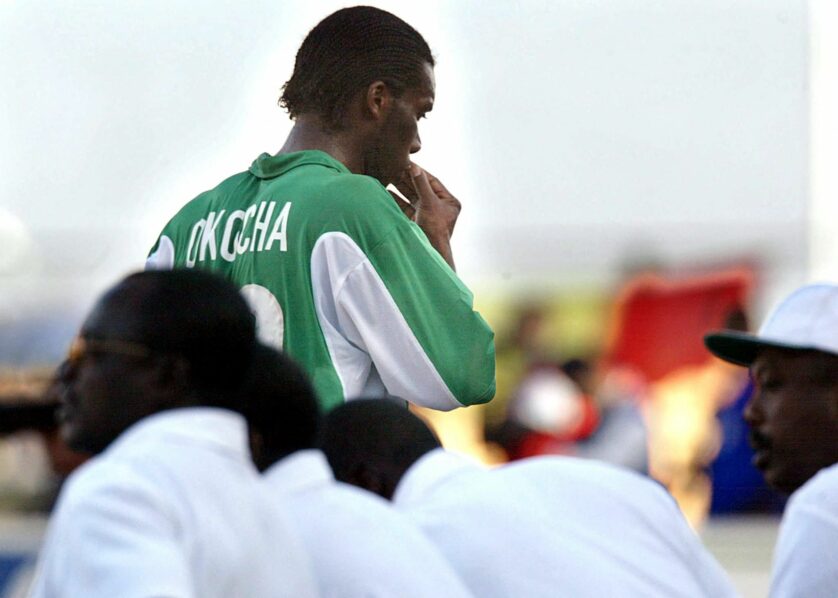
Okocha would go into Tunisia 2004 with a lot of confidence after his miraculous goalscoring act in the final few weeks of the 2002/2003 Premier League season saved Bolton from relegation and his fine form had trickled into the 2003/2004 season.
A week to his arrival in the Super Eagles camp, Jay Jay was part of a stunning 5-2 win over Aston Villa at the Reebok stadium in the League Cup semi final first leg, scoring two brilliant freekicks – the second of those being an absolute scorcher from an acute angle that defied the laws of physics to send the Trotters half way through into the League Cup final.
The Super Eagles, however, were wrapped in the usual theme common with most African sides: the issue of unpaid bonuses, salaries and poor camp preparations which threatened to derail plans of the side’s hopes of conquering the continent like the legendary ’94 side 10 years earlier at the El Menzah. Ironically, that team had a very young Jay Jay Okocha in their ranks who coincidentally was the only survivor left in the team.

With experienced heads like Finidi George, Sunday Oliseh sent to premature retirement for voicing their displeasure at being owed wages and bonuses at the previous AFCON in Mali by the NFA, the onus was left to Jay Jay to lead the side to glory in his first AFCON as captain.
The Super Eagles had barely managed to qualify for the tournament in the first place, needing a late Peter Odemwingie penalty in a 2-2 draw against Angola at the Samuel Ogbemudia Stadium, Benin in June 2003 to qualify ahead of closest rivals the Palanca Negras with just a point in the final standings.
The Super Eagles went into Tunisia left with only a few players of the Golden Generation in their ranks, with Nwankwo Kanu, Celestine Babayaro, Garba Lawal and Jay Jay Okocha being the last of the famous Atlanta ’96 squad still active.
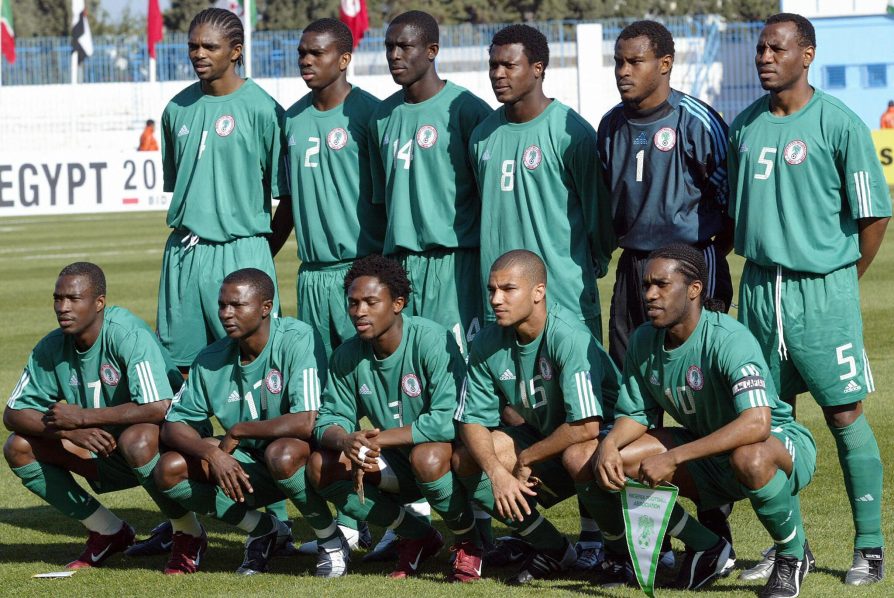
Expectations were building nonetheless by Nigerian fans going into the opening game but doubts began to arise after the Atlas Lions of Morocco beat Nigeria 1-0 through a 77th minute Youssef Hadji goal after the defensive frailties of the side were exposed. To compound the Eagles woes, the trio of Yakubu Ayegbeni, Babayaro, and Victor Agali were later sent home for breaking camp rules after partying just hours after that disappointing loss, thereby cutting the squad to 20 from the original 23 players.
Such scandal and poor start had the Super Eagles come under heavy criticism by the press and Nigerians back home – some even wrote off the team’s chances of going far in the tournament.
Jay Jay led by example in the group’s second game by scoring the second goal and assisting the third in a 4-0 win over Bafana Bafana as other goals from Joseph Yobo and a brace from tournament revelation Peter Odemwingie proved enough to send a warning to other teams of the Super Eagles’ potential despite being decimated in number.
Okocha would further enhance his legend into AFCON folklore, as his second half penalty became the tournament’s 1000th goal and received an honourary award to booth.
The final group game against next door neighbours Benin Republic, which ended in a 2-1 victory with Okocha being tightly marshalled by The Squirrels but it didn’t stop the mercurial midfielder from thrilling fans with his spell binding tricks and flicks as the Super Eagles flew into the next round. By virtue of finishing behind Morocco in the group, Nigeria were billed to face fierce rivals and defending champions the Indomitable Lions of Cameroon in a mouthwatering Quarter final clash at the Ben Jannet in Monastir which had been the Super Eagles home from the group stages ahead of the next round.
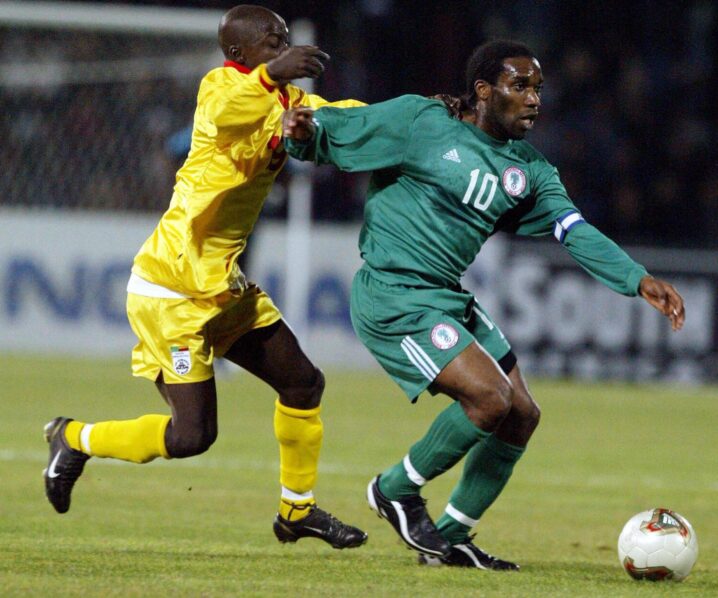
With AFCON hero Julius Aghahowa firing blanks thus far for Nigeria going into the game, Christian Chukwu was faced with the decision of either starting with Odemwingie or sticking with the back flip king. Cameroon were faced with a challenge of their own as the enigmatic Eto’o had been enduring a goal drought so far in Tunisia, but the reigning champions were buoyed by the form of the veteran striker Patrick Mboma who was the joint leading scorer going into the knockout round and confidence was high in the Cameroonian camp going into the clash as favourites.
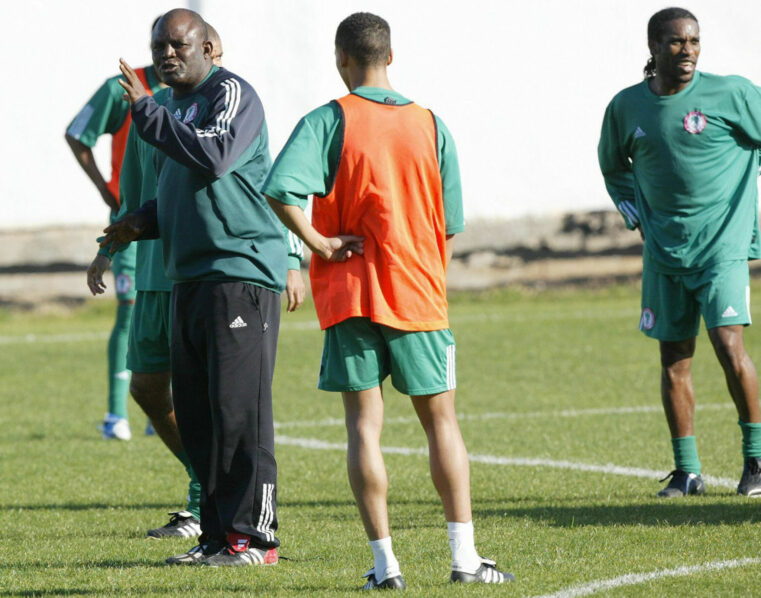
This would also be a game dominated in the media by the fans of both Okocha and Eto’o, with the outcome of the encounter seen as an early shout for the 2004 CAF AFOTY as well as the winner of the AFCON altogether. Nigerians were doubtful of the team overcoming their rivals having already lost three AFCON finals to the Indomitable Lions in the past even at their own backyard in Lagos four years earlier.
The fact that the Super Eagles were to wear their white away kit for the encounter didn’t sit well with some Nigerian fans who superstitiously believed the white kit gave the team “bad luck” against the Cameroonians, and thus confidence was running low amongst those fans and sections of the media.
On a sunny afternoon on the day God rested, Nigeria in their white sparkling adidas kits faced a physically imposing Cameroonian side led by the evergreen Rigobert Song in their lion claw inspired Puma kit in Monastir. If there was ever a game Jay Jay needed to step up, it was this game but his rival and reigning AFOTY Samuel Eto’o would throw the gaunlet with the game’s open goal and his first of the tournament, finishing expertly past Vincent Enyeama off a through ball from midfield which broke the Nigerian defence line in the 42nd minutes to the relief of the Cameroonians.
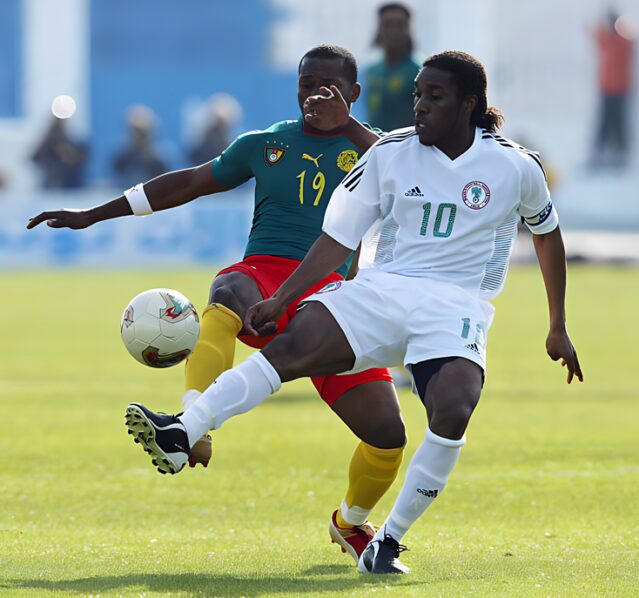
Nigerians suddenly had that all too familiar sinking feeling against their bitter rivals. Two minutes later, John Utaka would be fouled just near the box and Nigeria were awarded a freekick at the stroke of halftime. The hearts of 180 million Nigerians stopped in that moment as Jay Jay stood behind the ball.
An expectant ex-international and former teammate of Okocha, Stephen Keshi on commentary duty that day called out for a Jay Jay special and Okocha duly responded, curling a beautiful 20 yard freekick that kept Idris Kanemi rooted to the spot for 1-1 with virtually the last kick of the first half.
In the second half, John Utaka would finally nail the coffin of the Indomitable Lions after a racking diagonal through ball from Nwankwo Kanu set Utaka on his way and a breathtaking run was beautifully finished by the RC Lens man whose effort beat an onrushing Kanemi which hit the left post and in for a memorable 2-1 win. The victory gave the team and Nigerians confidence of going all the way to the final, but they would have to overcome a deafening Tunisian crowd at the Stade 7 Novembre in Rades in the semi finals.
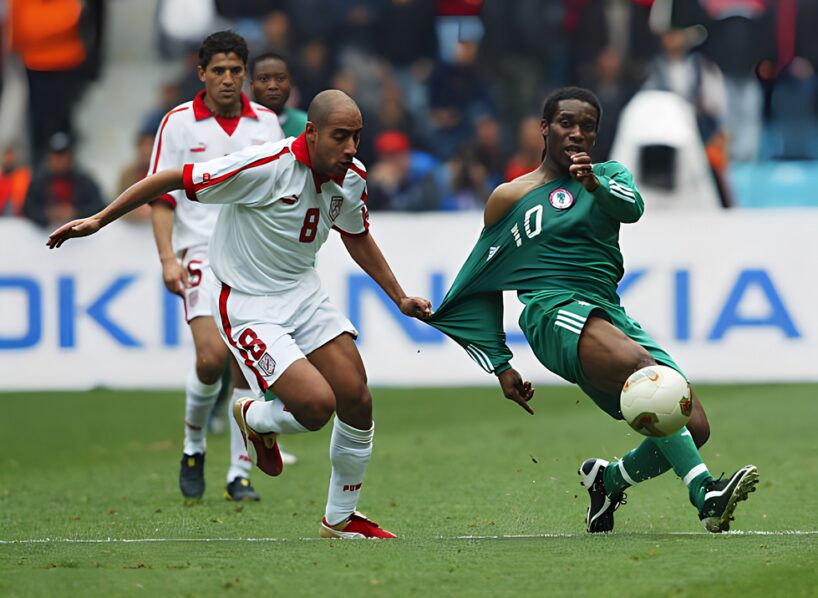
The Super Eagles would have to brave the hostile fans, partisan media and the whole nation to get to the final. After a goalless first half, the ’94 champions took the lead when Nwankwo Kanu was adjudged to have been fouled in the box by Radhi Jaidi in the 67th minute, leading to centre referee Koffi Codja pointing to the spot.
Jay Jay would step up and show nerves of steel by converting not once but twice past Ali Boumnijel after the referee called for a retake on the basis of encroachment by the players. Jay Jay had two Tunisian players assigned to him all game Medhi Nafti and Riadh Bouazizi but it didn’t deter his effectiveness, as he proved crucial to any attacking threat the Super Eagles possessed.
However, he could do nothing when Tunisia got their equalizer via a penalty. Tunisian striker Ziad Jaziri looked to have conned the referee by initiating contact with Seyi Olofinjana’s trailing leg from which the barrel-chested Khaled Badra stepped forward and sent Enyeama the wrong way to the joy of the ecstatic Tunisian crowd.
With the game going into extra-time, Peter Odemwingie had a chance of giving the Eagles the lead after being put through on goal, but his weak effort was easily saved by Boumnijel.
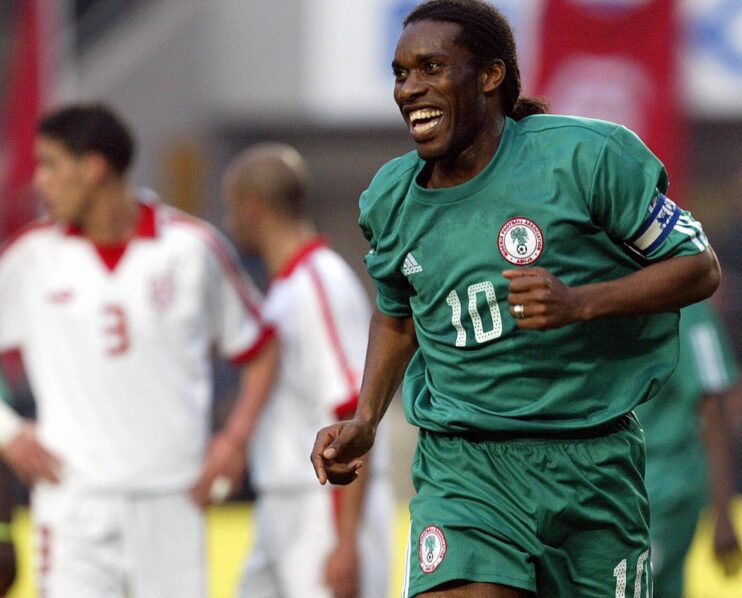
Penalties would eventually decide the tie as the Carthage Eagles triumphed 5-3 after Odemwingie had his penalty saved by his nemesis Boumnijel to the heartbreak of all Nigerians back home who were not so keen on seeing their team play another third-place match.
The third-place match was a repeat of the 2002 match up as the Frederic Kanoute inspired Malian side were the opponents. Going into the game two players were tied on four goals – Frederic Kanoute and Patrick Mboma while Jay Jay Okocha and Tunisia’s Francileudo dos Santos were both tied on three goals each with a chance of equaling the aforementioned two players.
Okocha would stake a claim to the top scorer gong with another free-kick brilliance from 25 yards albeit a slight deflection off Mahmadou Diarra’s boots for the opener in the 16th minute and he would be fundamental in the Super Eagles second after a fine interplay between Okocha and Udeze near the corner flag allowed the former to drill in a well delivered cross that met the head of an unmarked Odemwingie who directed his effort past Mahmadou Sidibe for 2-0.
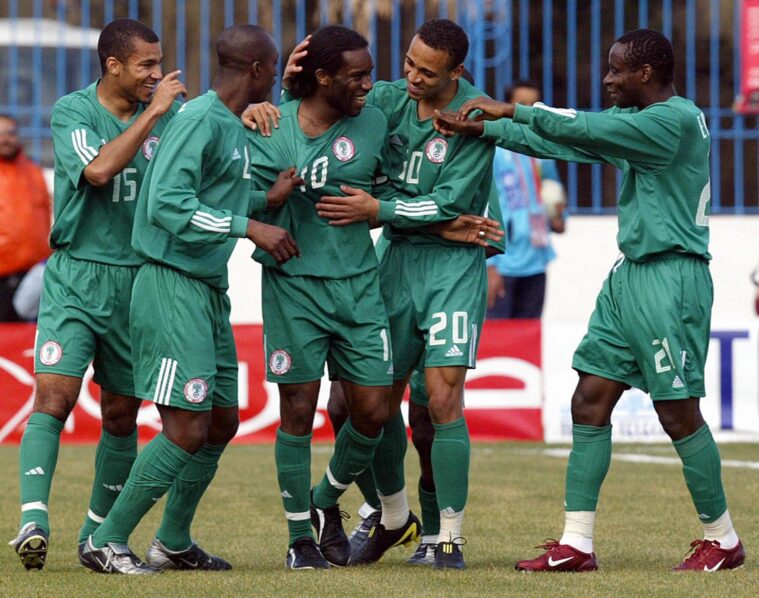
Mali would pull one back through Sedonoude Abouta, but the game would also be remembered for a virtuoso rainbow flick by Okocha just near the bye-line of the Malian defence over the head of a bamboozled Mamary Traore to the awe of the 2000-plus fans in attendance at the Ben Jannet and those watching at their homes. The match ended 2-1 as the Super Eagles secured yet another bronze medal which was met with a warm reception for the effort of the team. Okocha would end up scooping the tournament’s MVP award and share the golden ball gong with three other players.
Despite his brilliance in Tunisia and impressive season with Bolton which lead to a UEFA Cup qualification, Okocha was surprisingly third in the standings for the AFOTY gong later that year behind Eto’o and Drogba despite the two players failing to impress at or qualify for the AFCON altogether. The fact the duo were playing for bigger sides in Mallorca/Barcelona and Marseille – Eto’o joining Barca in the summer after overachieving with Mallorca in La Liga inspite of formidable oppositions in Madrid, Barcelona, Valencia and Deportivo La Coruna. Didier Drogba’s goals which powered a brilliant UEFA Cup final run with Marseille in 2004 perhaps worked against Jay-Jay’s chances in the polls. Okocha’s failure to win the Carling Cup with that fine Bolton side in Cardiff in March that year against Middlesbrough was also a critical reason the award went against him despite having one of his best playing seasons since the France ’98 World Cup period.
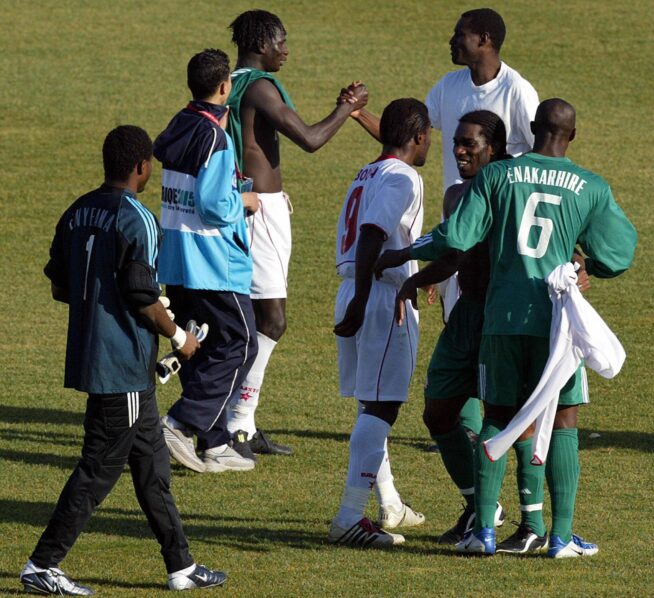
For a man who gave so much to African and world football, especially on an entertainment level, it is surprising sometimes to get a grip of the fact that a player of Jay Jay’s talent never won more titles with Nigeria, his clubs, an African Footballer of the year award or even nominated for the Ballon d’Or award despite being a key player in all the clubs he turned out for.
Players of his ilk in the 90s and mid-2000s all played central roles in title triumphs for both club and country but luck seemed to desert perhaps Nigeria’s greatest player in his prime years.
His AFCON triumph in 1994 and Olympic Gold triumph in Atlanta in 1996 are the only major titles in a career that should have possessed so much more, which is why his career isn’t compared to other similar greats of his era in terms of achievements. But perhaps not all players get what they deserve on hindsight.
He would feature at AFCON 2006 in what was his final swansong as an international player following the Super Eagles missing out in qualifying for Germany 2006. However, the 2004 AFCON in Tunisia will always remain one tournament that still has many eulogizing on his brilliance and in contrast the misfortune in his chase for football glory.
[ad unit=2]


